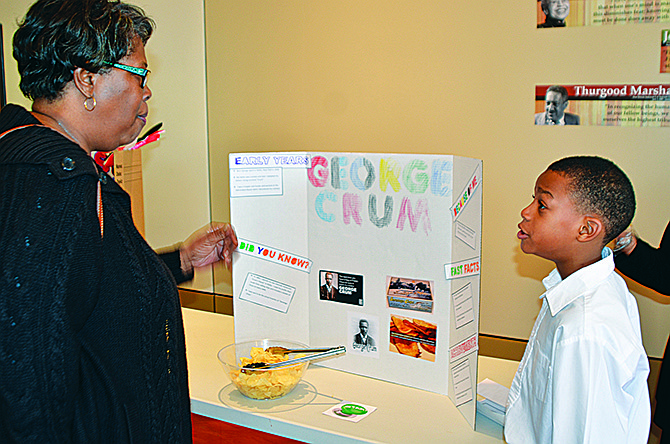Quinn Chapel AME's youth group unveiled its second annual Black History Museum on Sunday, featuring a dozen prominent African Americans from baseball great Jackie Robinson to author/poet Maya Angelou.
Youth Director Candace Williams helped come up with a list of possible subjects, then a dozen youth members of the congregation picked their subjects, researched them and designed an informational poster board on their subjects.
The dozen youth manned their stations in the church's community room as the Sunday morning church service let out, ready to show off their exhibits.
Some featured well-known people, such as President Barack Obama, while others were more obscure, but left lasting contributions. John James, 8, offered a bowl of potato chips at his display of George Crum. Crum was a trapper in the 1800s who became renown for his culinary skills after opening a restaurant that offered "Saratoga chips" - the now-ubiquitous snack known as potato chips.
"This year we chose some people not a lot of people had heard of like George Crum," Williams said. "We tried to find some people who were either left out of history or that we don't talk about enough."
The kids working on the project ranged in age from 5 to high school, she said.
Pastor Cassandra Gould said the project is in conjunction with Black History Month, and projects such as these take on even more importance with the dialogue on race relations following the racial strife in Ferguson and other cities last year.
Gould attended predominantly white schools since fifth grade, and said black history was never emphasized.
"My mother marched in Selma, (Alabama)" during the 1960s civil rights protests, she said. "And I would always be surprised when I got to school and be like, "We only got one page in this book?' Or they'd tell you about Dr. (Martin Luther) King, and there would be this slave ship this small," she said, drawing her fingers closer. "It really didn't speak to the magnitude of that.
"I think it's very important that our children self-identify, and not depend on others to shape the story. With Ferguson being a catalyst for long-overdue conversations about race, I think it's important to shape our own narrative."
The museum will be open to the church and community on Sundays throughout February. There's no admission fee, but donations go to the church's youth ministry.

